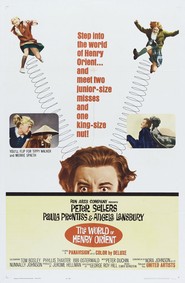Shine reveals another fine performance by Geoffrey Rush, about a dysfunctional real-life concert pianist, David Helfgott, who has a nervous breakdown trying to master RACH III, as it was dubbed, the infamously difficult Rachmaninoff Piano Concerto No. 3. And winning at mastering the piano is the theme of The Competition, with Richard Dreyfuss and Amy Irving among the contestants in a marathon piano contest. Lee Remick is Irving’s piano teacher. Talk about being saturated with classical music: there are concertos and solo pieces by Prokofiev, Beethoven, Ginastera, Brahms and Chopin.
 One more film before the pièce de résistance, okay? I must include The World of Henry Orient. As one of the “on” films of Peter Sellers—I’m an “on and off again” fan of the actor—it is a delightful comedy about two hyperactive, pseudo-sophisticated teenagers, running, jumping and skipping—literally—all over New York. Gil (Merrie Spaeth) and Val (Tippy Walker) follow concert pianist Henry Orient (Sellers), popping up during numerous rendezvous with his jittery married lover (Paula Prentiss), prompting acute paranoia in the couple. Such adoration as Val’s is rarely extended to a classical artist, but she is love-sick over her “dreamy” idol, though admitting Orient’s scales need a little work. She plays a bit of Rachmaninoff’s Second Concerto on the piano, then with friend Gil listens to it on an LP.
One more film before the pièce de résistance, okay? I must include The World of Henry Orient. As one of the “on” films of Peter Sellers—I’m an “on and off again” fan of the actor—it is a delightful comedy about two hyperactive, pseudo-sophisticated teenagers, running, jumping and skipping—literally—all over New York. Gil (Merrie Spaeth) and Val (Tippy Walker) follow concert pianist Henry Orient (Sellers), popping up during numerous rendezvous with his jittery married lover (Paula Prentiss), prompting acute paranoia in the couple. Such adoration as Val’s is rarely extended to a classical artist, but she is love-sick over her “dreamy” idol, though admitting Orient’s scales need a little work. She plays a bit of Rachmaninoff’s Second Concerto on the piano, then with friend Gil listens to it on an LP.
The high point of the film for me is the piano concerto Orient performances. Written especially for the movie by Kenneth Lauber, the concerto is in the then trendy, always much satirized, avant-garde style, with dissonant chords, keyboard banging, bristly, irregular rhythms and a blast from a water-logged steam whistle, with the nervous performer anticipating his one, big moment. Two members of the orchestra play checkers during their rests and an elderly man in the audience turns off his hearing aid. The conductor, eyes closed, emotes over the music, his hands bobbing freely at the ends of his wrists—all à la Leonard Bernstein, who, in 1964, when the film was made, was in the midst of his tenure as music director of the New York Philharmonic.
Orient is, at best, a second-rate pianist, a “non-Van Cliburn” as John Fiedler reminds him. Ending the cadenza and preparing for the orchestra’s re-entry, he modulates back to what he assumes is the home key—if there is one in this piece!—but receives a shake of the head from the conductor. No? So, scaling down, then back up the keyboard, he modulates to another key. No? Again he tries. And again—no. Finally, the conductor mouths “B-flat” and, at last, Orient finds the right key!
The girls, of course, appear at the concert and further unnerve Orient. As the concert occurs relatively early in the film, each time the pianist catches the girls spying on him—at restaurants, at his hotel, in Central Park—the discords of the concerto break into Elmer Bernstein’s contrastingly tuneful score.